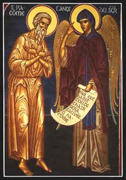Lectio Divina as School of Prayer
To speak of the “reading” of Scripture among the Fathers leads, moreover, to confusion. Reading properly so called, as we understand it today, must have been, in fact, quite rare. The monks of Pachomius, for example, who came for the most part from paganism, were obliged, on their arrival at the monastery, to learn to read if they could not already do so, so as to be able to learn the Scriptures. A text of the rule says that there should be no-one in the monastery who does not know by heart at least the New Testament and the Psalms. But once memorized, these texts become the object of a “meletè“, a continual meditatio or ruminatio all the day long and for a good part of the night, in private as well as in the common prayer. This ruminatio of Scripture is not understood as vocal prayer, but rather as a constant contact with God through his Word. A constant attentiveness, which itself becomes a constant prayer.
A story from the apophthegmata shows clearly this relative importance of reading compared with the absolute importance of the contents of Scripture:
“At a time of great cold, Serapion meets in Alexandria a poor man who is completely naked. He says to himself: “This is Christ, and I am a murderer if he dies without my having tried to help him.” So Serapion takes off all his clothes and gives them to the poor man, then he remains naked in the street with the only thing he has left, a Gospel under his arm… A passer-by, who knows him, asks him: “Abba Serapion, who has taken away your clothes?” And Serapion, showing his Gospel, replies: “This is the one who has taken away my clothes.” Serapion then goes to another place and there sees someone who is being taken to prison, because he is unable to pay a debt. Serapion, seized with pity, gives him his Gospel, so that he can sell it and so pay his debt. When Serapion returns to his cell, no doubt shivering, his disciple asks him where his tunic is, and Serapion replies that he has sent it where it is more needed than on his body. To his disciple’s second question : “And where is your Gospel?’, Serapion replies: I have sold the one who continually told me: Sell your goods, and give to the poor (Lk. 12,33); I have given it to the poor that I might have greater confidence on the day of judgment” (Pat. Arm. 13, 8, R: III, 189).
As we saw at the beginning, Antony, a Christian from birth, was converted to the ascetical life by lectio divina, or the sacra pagina, proclaimed in the local ecclesial community, during the celebration of the liturgy.
 Pachomius, who, on the contrary, came from a pagan family of Upper Egypt, was also converted by Scripture, but by Scripture interpreted and incarnated in the concrete life of a Christian community who lived the Gospel, that of Latopolis. You know the story: The young Pachomius was conscripted into the Roman army and sent on a ship that took him with the other recruits to Alexandria. One evening the ship stopped at Latopolis and as the conscripts were put in prison the Christians of the place brought food and drink to the prisoners. That was Pachomius first encounter with Christianity.
Pachomius, who, on the contrary, came from a pagan family of Upper Egypt, was also converted by Scripture, but by Scripture interpreted and incarnated in the concrete life of a Christian community who lived the Gospel, that of Latopolis. You know the story: The young Pachomius was conscripted into the Roman army and sent on a ship that took him with the other recruits to Alexandria. One evening the ship stopped at Latopolis and as the conscripts were put in prison the Christians of the place brought food and drink to the prisoners. That was Pachomius first encounter with Christianity.
For Antony, representative par excellence of the anchoritic life, as for Pachomius, representative of the cenobitic, Scripture is above all a Rule of life. It is even the only true Rule of the monk. Neither Antony nor Pachomius wrote a Rule in the sense in which it would be understood in the monastic tradition after them, although a certain number of practical rules of Pachomius and his successors have been brought together under the name of the “Rule of Pachomius”.

Leave a Reply